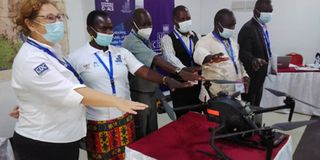Prime
Mak rolls out drone use for drugs supply

District leaders and officials from Infectious Diseases Institute launch the pilot project that involves the use of drones to improve medical supplies in West Nile region last Wednesday. PHOTO/SCOVIN ICETA
What you need to know:
The research project will assess the efficiency of using drones to deliver medical supplies.
The Infectious Diseases Institute (IDI) of Makerere University, with funding from the United Nations Capital Development Fund (UNCDF) is assessing the use of drones to transport medical supplies, among other to remote areas of Moyo and Adjumani districts.
The project was prompted by delays in delivery of medical supplies due to bad roads, inadequate fuel and a shortage of vehicles.
So far, two drones have been secured for the pilot study before the project is extended to other districts.
The drone project coordinator, Ms Joan Akullo, said the gadgets would support surveillance mechanisms, early reporting of any health threats or outbreak indicators, including rapid response to Covid-19.
“Using this system, automated medical phone calls are used to monitor and follow-up Covid-19 patients for 14 days. It will also provide quick transportation of Covid-19 samples from various health centres scattered all over the region including Amuru, Adjumani and Arua hospitals,” she said.
The assistant District Health Officer of Adjumani, Mr Godfrey Manga, told Daily Monitor that drones take about 30 minutes to travel from Adjumani to Moyo. He said a vehicle takes two hours depending on the status of the Laropi Ferry services.
“This is a cheaper mode of transport that saves fuel and time,” Mr Manga said.
Two different drone types; a multi-rotor for short distances of up to 30kms, and a fixed-wing drone for longer distances covering more than 30kms have been procured to provide the health services.
Many countries across the world are now using the drone technology to deliver medical supplies to various health centres.
Mr Chris Lukolyo, the UNCDF digital lead in Uganda, said the research project will assess the efficiency of drone deliveries.
“The use of drone technology complements our existing work in the health sector around improving the community health service delivery, and stock and supply chain management of essential drugs and medical supplies,’’ he said.
Ms Rosalind Parkes-Ratanshi, the research and development lead for Academy of Health Innovation and IDI, said they are using similar technology to deliver HIV/Aids drugs in hard-to-reach areas in Kalangala District.
“It is the first step in developing the use of medical drones in disease outbreaks in Uganda. This drone technology project will help us to understand how to reduce the turnaround time for Covid-19 test samples,” Ms Rosalind said.
The board member of Academy Health Innovation Uganda, Dr Christine Ondoa, said: “We hope the government of Uganda adopts this initiative as one of the ways of improving health services delivery. Emergency medical supplies like in Rwanda are done in this way...”
The chairperson of Moyo District, Mr Williams Anyama, said: “With geographical barriers like difficult terrains and very remote areas, drones can solve a piece of the logistical problem. We have lost lives due to delays at the landing site.”
There has been delays at ferry landing sites because there is no road that connects Moyo to Adjumani. One has to wait for about 40 minutes to cross River Nile on the ferry and there has been a challenge in handling emergency cases. Drones will make it possible to deliver blood, vaccines, birth control pills, snake bite serum and other medical supplies.




